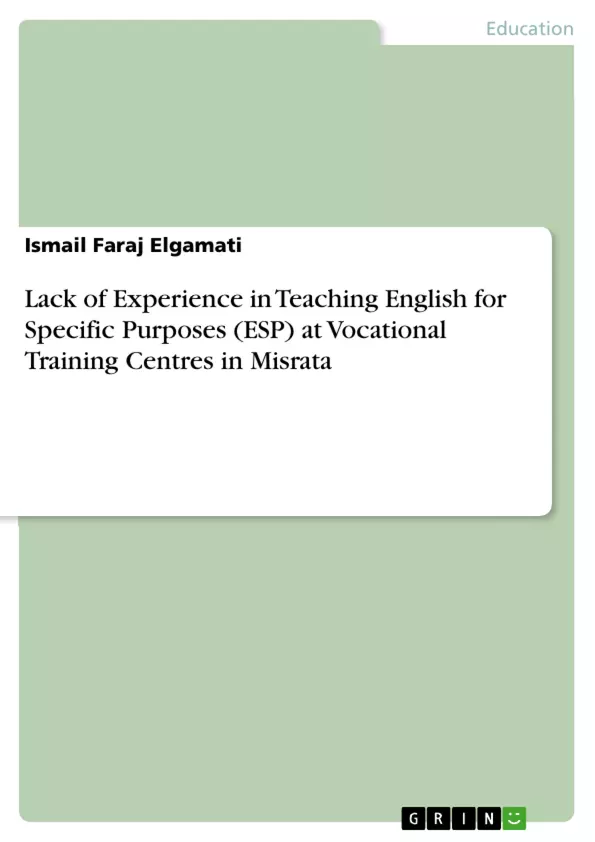This paper focuses on teaching English for Specific Purposes (ESP). ESP works to provide learners with the focal point of the course process that ESP learners need in their majors. The aim of this work is to enhance the awareness of the teachers who are involved in teaching ESP programmes. The study is divided into three chapters. The First Chapter investigates the problem and hypothesis of the study on the assumption that the teachers of Vocational Institutes are not capable to teach the textbook as an ESP course. Since the study deals with the Third Year Classes in Misurata Vocational Institutes, a look at the textbook syllabus is given. Chapter Two gives an analysis of the results of the teachers’ the classroom observation, as they are the practical part of the study. Finally, Chapter Three presents the conclusions of the study followed by some recommendations.
Table of Contents
- Abstract
- 1. Introduction
- 1.1. ESP
- 1.2. The Problem of the Study
- 1.3. The Aim of the Study
- 1.4. The Hypothesis of the Study
- 1.5. The Procedures of the Study
- 1.6. The Status of the Textbook Used in Third Year of Vocational Training Institutes
- 2. Data Analysis
- 2.1. Introduction
- 2.3. Classroom Observation
Objectives and Key Themes
This research focuses on the teaching of English for Specific Purposes (ESP) in the Third Year Classes of Vocational Training Institutes in Misurata. The study examines the extent to which teachers utilize ESP approaches in their teaching of the prescribed textbook and aims to raise awareness among teachers regarding the importance of effective ESP instruction. The study emphasizes the need to shift from general English (GE) teaching methods to specialized ESP techniques. The objectives of this research include:
- Investigating the challenges faced by teachers in delivering the ESP curriculum.
- Analyzing the effectiveness of the ESP textbook.
- Assessing the practical application of ESP methods in the classroom.
- Developing recommendations for improving the teaching of ESP in vocational training institutes.
Chapter Summaries
- Chapter 1: Introduction
This chapter presents an overview of ESP, exploring its historical development and its relevance within the Libyan educational context. The research problem is identified as the inconsistency between the ESP-oriented textbook and the actual teaching practices. The study's aim is to investigate the factors contributing to this discrepancy and the potential impact on student learning. The chapter outlines the study's hypothesis, research procedures, and a detailed analysis of the textbook used in the Third Year classes of Vocational Training Institutes.
- Chapter 2: Data Analysis
This chapter focuses on the data collected through classroom observation, aiming to determine the extent to which teachers implement ESP methodologies in their teaching of the Third Year English textbook. The chapter examines the types of teaching methods employed and the extent to which the textbook's activities, particularly those related to speaking, writing, and listening, are incorporated into the classroom.
Keywords
This research explores key terms and concepts related to English for Specific Purposes (ESP), specifically within the context of vocational education. The study focuses on the implementation of ESP methodologies in the Libyan educational system, analyzing the effectiveness of ESP-oriented textbooks, and identifying challenges faced by teachers in delivering ESP instruction. The study emphasizes the importance of aligning teaching practices with the specific needs of vocational learners and highlights the need to bridge the gap between ESP theory and classroom practice.
What is English for Specific Purposes (ESP)?
ESP focuses on teaching English that is directly relevant to the specific professional or academic field of the learners, rather than general English.
What is the main problem addressed in the Misrata study?
The study identifies that many teachers in vocational training institutes lack the experience and capability to effectively teach specialized ESP textbooks.
Who are the participants in this research?
The research focuses on teachers and students in the third-year classes of vocational training institutes in Misrata, Libya.
How was the teaching practice evaluated?
The evaluation was conducted through practical classroom observations to see how teachers implement the textbook's activities, such as listening and speaking.
What is the aim of the study?
The aim is to raise awareness among teachers and provide recommendations to bridge the gap between ESP theory and actual classroom practice.



